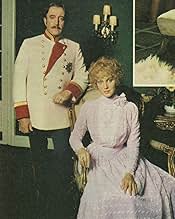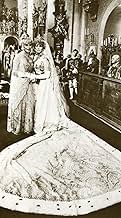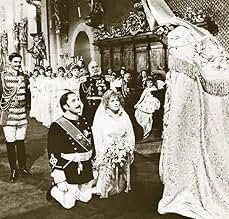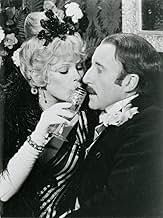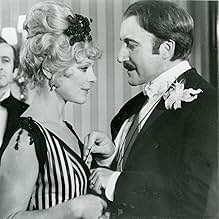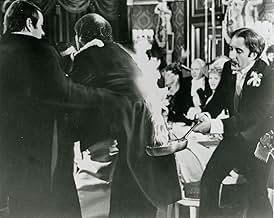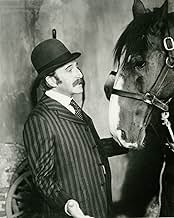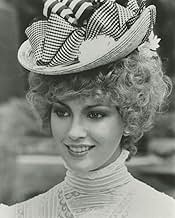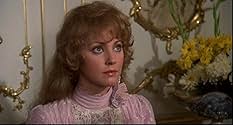AVALIAÇÃO DA IMDb
5,2/10
1,4 mil
SUA AVALIAÇÃO
Adicionar um enredo no seu idiomaIn order to save King Rudolph of Ruritania from assassins and murderous usurpers, the kingdom hires a look-a-like London cabby to impersonate the Monarch.In order to save King Rudolph of Ruritania from assassins and murderous usurpers, the kingdom hires a look-a-like London cabby to impersonate the Monarch.In order to save King Rudolph of Ruritania from assassins and murderous usurpers, the kingdom hires a look-a-like London cabby to impersonate the Monarch.
- Direção
- Roteiristas
- Artistas
Avaliações em destaque
Peter Sellers made a career mining humor and whimsy from weakish scripts; problem is you have to look hard to find those lesser-if-worthy vehicles where his performances make a major difference, and when you do, you may feel disappointed anyway. But give something like "The Prisoner Of Zenda" a chance, and you may be entertained, albeit fitfully.
With the sudden death of Ruritania's ruler Rudolf IV, the crown falls to his clueless, lascivious twit of a son. Already being hunted by a cuckolded count (Gregory Sierra), Rudy (Sellers) now must also escape the murderous attentions of his half-brother Michael (Jeremy Kemp) and his confederates. But help arrives from an unlikely place, a hansom cab driver named Sidney (also Sellers) who is the spitting image of Rudy. Sidney goes along for the sake of a comfortable sinecure for his aging horse, but soon wonders if "this king game" is worth the risk.
The clock was running out on poor Sellers, and you can see it. The old manic energy that once drove him visibly flickers as you watch him here. Making his life's dream "Being There" was just around the corner, but being Sellers, he couldn't resist another trip to the light- comedy well first for some quick cash.
"You might have noticed the king has trouble with his R's," Sidney is told, referencing the speech impediment which Sellers employs when playing "Wudy."
"Yeah, I had that once," Sidney replies. "You get it from sitting on damp grass."
That's about the apogee for the one-liners offered in "Zenda," which coasts along more on ambiance, colorful supporting characters, a glittery Henry Mancini score, and Sellers impressing by working the corners effectively in his two starring roles. He plays Sidney especially with the same lighter touch he would employ more effectively as Chance the Gardener in "Being There," this time channeling Michael Caine rather than Stan Laurel.
I like this film, sometimes a lot, but it's not an easy one to defend. It starts out painfully slow, opening on the soon-to-be-departed Rudolf IV (Sellers again, in what amounts to a cameo in his own movie) taking a balloon ride to celebrate his 80th birthday, a sequence that involves him cackling a lot and playing with a telescope and a champagne bottle before literally ending with a wet splat when the doddering monarch does a full header into a well.
Scriptwriters Dick Clement and Ian La Frenais don't offer much in the way of comic setpieces; for the most part they are content simply replaying the familiar "Zenda" storyline and sneaking in light humor where they can. After a while, a long while, it sort of works, as when Sidney finds himself caught in bed with Rudy's mistress and her very angry husband.
Sierra is very much over-the-top, but solidly so, as the avenging count, setting up various silly traps that end up hurting only him. Meanwhile, Lionel Jeffries and Simon Williams as a pair of Rudy's loyal aides enjoyably try to keep a reluctant Sidney working for them. Stuart Wilson makes a strong impression as the wicked but sporting Rupert, working against Rudy but playing his own side. His maniacal laugh is one of the movie's more amusing recurring bits.
Director Richard Quine supplies his twin Peters with the affectionate attentions of three leading ladies. Elke Sommer and Catherine Schell starred with Sellers in other films, while the third, Lynne Frederick, was at the time Sellers fourth wife, and would become his widow the following year. All add to the general merriment without standing out too much; Schell does so the most when she leads Sidney in an exchange of chicken imitations.
By this time, the movie finally kicks in as something worthwhile, but it may be too late for all but Sellers' faithful fans. As I count "The Pink Panther Strikes Again" as my all-time favorite film, I enjoyed the way "Zenda" works in the same spirit, Mancini music and pratfalls involving Sellers doubles abounding. There's even a scene between Sidney and regular Sellers cohort Graham Stark involving a growling dog that brings to mind one of "Strikes Again's" most remembered scenes, even getting its own agreeable payoff.
But if you aren't a Sellers fan going in, "Zenda" may not only fail to pull you in but leave you wondering what the fuss with him was all about. It's the subtle stuff that clicks for me, the little moments of grace and dignity from Sidney, and Rudy making randy with Sommer's stately torso ("We have mowtains to cwimb!") The real problem with "Zenda" is not its own fault, but the fact it was about all Sellers would have left to give in the way of silly comedy. I liked what I got, but wished it had been more.
With the sudden death of Ruritania's ruler Rudolf IV, the crown falls to his clueless, lascivious twit of a son. Already being hunted by a cuckolded count (Gregory Sierra), Rudy (Sellers) now must also escape the murderous attentions of his half-brother Michael (Jeremy Kemp) and his confederates. But help arrives from an unlikely place, a hansom cab driver named Sidney (also Sellers) who is the spitting image of Rudy. Sidney goes along for the sake of a comfortable sinecure for his aging horse, but soon wonders if "this king game" is worth the risk.
The clock was running out on poor Sellers, and you can see it. The old manic energy that once drove him visibly flickers as you watch him here. Making his life's dream "Being There" was just around the corner, but being Sellers, he couldn't resist another trip to the light- comedy well first for some quick cash.
"You might have noticed the king has trouble with his R's," Sidney is told, referencing the speech impediment which Sellers employs when playing "Wudy."
"Yeah, I had that once," Sidney replies. "You get it from sitting on damp grass."
That's about the apogee for the one-liners offered in "Zenda," which coasts along more on ambiance, colorful supporting characters, a glittery Henry Mancini score, and Sellers impressing by working the corners effectively in his two starring roles. He plays Sidney especially with the same lighter touch he would employ more effectively as Chance the Gardener in "Being There," this time channeling Michael Caine rather than Stan Laurel.
I like this film, sometimes a lot, but it's not an easy one to defend. It starts out painfully slow, opening on the soon-to-be-departed Rudolf IV (Sellers again, in what amounts to a cameo in his own movie) taking a balloon ride to celebrate his 80th birthday, a sequence that involves him cackling a lot and playing with a telescope and a champagne bottle before literally ending with a wet splat when the doddering monarch does a full header into a well.
Scriptwriters Dick Clement and Ian La Frenais don't offer much in the way of comic setpieces; for the most part they are content simply replaying the familiar "Zenda" storyline and sneaking in light humor where they can. After a while, a long while, it sort of works, as when Sidney finds himself caught in bed with Rudy's mistress and her very angry husband.
Sierra is very much over-the-top, but solidly so, as the avenging count, setting up various silly traps that end up hurting only him. Meanwhile, Lionel Jeffries and Simon Williams as a pair of Rudy's loyal aides enjoyably try to keep a reluctant Sidney working for them. Stuart Wilson makes a strong impression as the wicked but sporting Rupert, working against Rudy but playing his own side. His maniacal laugh is one of the movie's more amusing recurring bits.
Director Richard Quine supplies his twin Peters with the affectionate attentions of three leading ladies. Elke Sommer and Catherine Schell starred with Sellers in other films, while the third, Lynne Frederick, was at the time Sellers fourth wife, and would become his widow the following year. All add to the general merriment without standing out too much; Schell does so the most when she leads Sidney in an exchange of chicken imitations.
By this time, the movie finally kicks in as something worthwhile, but it may be too late for all but Sellers' faithful fans. As I count "The Pink Panther Strikes Again" as my all-time favorite film, I enjoyed the way "Zenda" works in the same spirit, Mancini music and pratfalls involving Sellers doubles abounding. There's even a scene between Sidney and regular Sellers cohort Graham Stark involving a growling dog that brings to mind one of "Strikes Again's" most remembered scenes, even getting its own agreeable payoff.
But if you aren't a Sellers fan going in, "Zenda" may not only fail to pull you in but leave you wondering what the fuss with him was all about. It's the subtle stuff that clicks for me, the little moments of grace and dignity from Sidney, and Rudy making randy with Sommer's stately torso ("We have mowtains to cwimb!") The real problem with "Zenda" is not its own fault, but the fact it was about all Sellers would have left to give in the way of silly comedy. I liked what I got, but wished it had been more.
The 1979 remake of Hope's Zenda story is a prime example of the sort of poor judgement Peter Sellers was so often subject to in his choice of films. The whole thing is roundly dispiriting to watch, and "palpably uneasy" as Halliwell's Film Guide comments. The script lacks any sense of the comic or adventurous that one would expect of a Zenda filming with Sellers. So often, exaggeration and chatter take the place of any sort of acting. Even Sellers, often impressive in such bad films, creates two very uninteresting characters, based it seems, solely on the rather stereotypical voices he creates for them. Other performances pass by, indistinguishable from each other and unwanted. John Laurie has nothing to do whatsoever, the token females are particularly dull... the whole thing is completely pointless and all too far from being enjoyable... Most certainly as bad, if not worse than the more derided "The Fiendish Plot of Fu Manchu". Rating:- */*****
This must be one of his best movies. The movie was made on location in Austria. The Castle in Vienna is the real Schoenbrunn castle where the empire of the Habsburg monarchy ruled for almost a 1000 years. The sets are original and outstanding. Peter Sellers played a double role where he plays a London cab driver (coachman) Sydney Frewin who is a look a like of the crown prince Rudolf of Rurotania who's brother wants to get rid of him and take on the crown himself after the death of their father. The movie starts when the King dies celebrating his 80tiest birthday in a balloon. When he accidentally punctures his balloon with a cork from his Champaign bottle, plummets to the ground, his balloon gets tangled up onto a tree in a village square and then he finally falls into the well below while giving a speech to the locals from the tree in the balloon. Crown prince Rudolf's spends most of his time in the London Saloons but he must return to Rurtania where his life is in danger. The London cab driver, Sydney Freud is accidentally discovered as look a like by the crown princes assistant and send ahead to Rurotania as a decoy. Sydney Freud is unaware of the real reason why he was offered a good position in Rurotania till he arrives there. Prince Rudolf has an affair with a beautiful countess. When her husband the count discovers this he is also after the crown prince. As the real prince gets kidnapped, Sydney takes his place till the real prince can be recovered. Sydney can not understand at first why the count is always after him wanting to slit his throat.. There is too much to tell but the movie has a happy ending where Sydney Frewin becomes the King and the princess gets the man she really loves. The real crown prince Rudolf goes back to London this time as Sydney Freud where he does what he loves best. Visiting the London gambling clubs and maintaining his affair with the countess. Great family entertainment! The only bad thing about this movie is that it's not available.
I should probably begin this review by mentioning my familiarity of the source material - or rather, the lack of it. I have never read the novel, nor have I seen any of the previous film versions. Pretty much all I knew about "Zenda" before watching this movie was the basic premise. I also knew the story was originally serious in tone. But I was open to it being done in a comic fashion, because with stuff like mistaken identity, the premise did indeed have comic possibilities.
Sadly, everyone involved with this movie drops the ball. I'll start with Sellers. I have found him funny in other movies, but he simply isn't funny here. His performance here simply lacks energy and seems sluggish. I do know he was having health problems at this point in his life, and this may explain his lack of enthusiasm.
But even if Sellers was in top form here, it's unlikely he could have saved the movie. The movie is terribly directed - the slow-moving story feels as sluggish as Sellers. And when it comes to delivering the (very sporadic) comedy, there is a curious feel to it. The comedy feels like it's being directed by someone intentionally trying to make it as serious as possible. Though many of the gags would still be dead on arrival even with a top comedy director, since they are predictable and very familiar.
Judging by the ragged look of the old print Universal is currently using for the movie's television appearances, they are in no hurry to restore this movie. No wonder.
Sadly, everyone involved with this movie drops the ball. I'll start with Sellers. I have found him funny in other movies, but he simply isn't funny here. His performance here simply lacks energy and seems sluggish. I do know he was having health problems at this point in his life, and this may explain his lack of enthusiasm.
But even if Sellers was in top form here, it's unlikely he could have saved the movie. The movie is terribly directed - the slow-moving story feels as sluggish as Sellers. And when it comes to delivering the (very sporadic) comedy, there is a curious feel to it. The comedy feels like it's being directed by someone intentionally trying to make it as serious as possible. Though many of the gags would still be dead on arrival even with a top comedy director, since they are predictable and very familiar.
Judging by the ragged look of the old print Universal is currently using for the movie's television appearances, they are in no hurry to restore this movie. No wonder.
This is a very lavish looking, picturesque romp that should have been a sure fire hit. "Porridge" scriptwriters Dick Clement and Ian Le Frenais were the men responsible for turning the classic Anthony Hope into a comedy, which shouldn't have been too difficult bearing in mind the ridiculous scenario linked to the main story. However, this scenario is all they went for, and any characterisation or satirical touches are abandoned and a lot of cartoonish setups such as Gregory Sierra's role and also other segments such as the explosive bowls game and the early scene in the restaurant replace any serious comedy. Therefore, in his dwindling health and sorrowful state, Sellers looks a bit out of place amongst the diving into the water routines and the jumping of a tall castle stints. It is very similar to his Fu Manchu experience two years later (when he also played two roles) in that he's still putting the work in but to little effect. The film is a reminder of his earlier years and really backfires as a poor man's Pink Panther. However, he still proves that he can act (which is a lot more than most actors these days) despite the poor material and backed by a host of regular artists such as Catherine Schell, Elke Sommer (both stars of Pink Pantherfs), Graham Stark, John Laurie, Jeremy Kemp (who had starred in Sellers' The Blockhouse in 1972) - it should have been better considering the quality of Sellers' other films at the time, but it does fall very flat.
Você sabia?
- CuriosidadesThis movie was made and released about eighty-five years after Anthony Hope's novel "The Prisoner of Zenda" was first published in 1894.
- Erros de gravaçãoAs Peter Sellers and his entourage approach the city in this Ruritarian romantic adventure, a tank truck and two Volkswagens can be seen on the horizon.
- Citações
Rudolf IV: Michael, why do you hate me so?
Duke Michael: Because you are conceited, arrogant, spineless, selfish, shallow, pity, pompous and pitiful!
Rudolf IV: But apart from that?
Principais escolhas
Faça login para avaliar e ver a lista de recomendações personalizadas
- How long is The Prisoner of Zenda?Fornecido pela Alexa
Detalhes
Bilheteria
- Orçamento
- US$ 12.500.000 (estimativa)
- Faturamento bruto nos EUA e Canadá
- US$ 7.650.600
- Fim de semana de estreia nos EUA e Canadá
- US$ 2.425.315
- 28 de mai. de 1979
- Faturamento bruto mundial
- US$ 7.650.600
- Tempo de duração1 hora 48 minutos
- Proporção
- 1.85 : 1
Contribua para esta página
Sugerir uma alteração ou adicionar conteúdo ausente

Principal brecha
By what name was O Prisioneiro de Zenda (1979) officially released in India in English?
Responda
